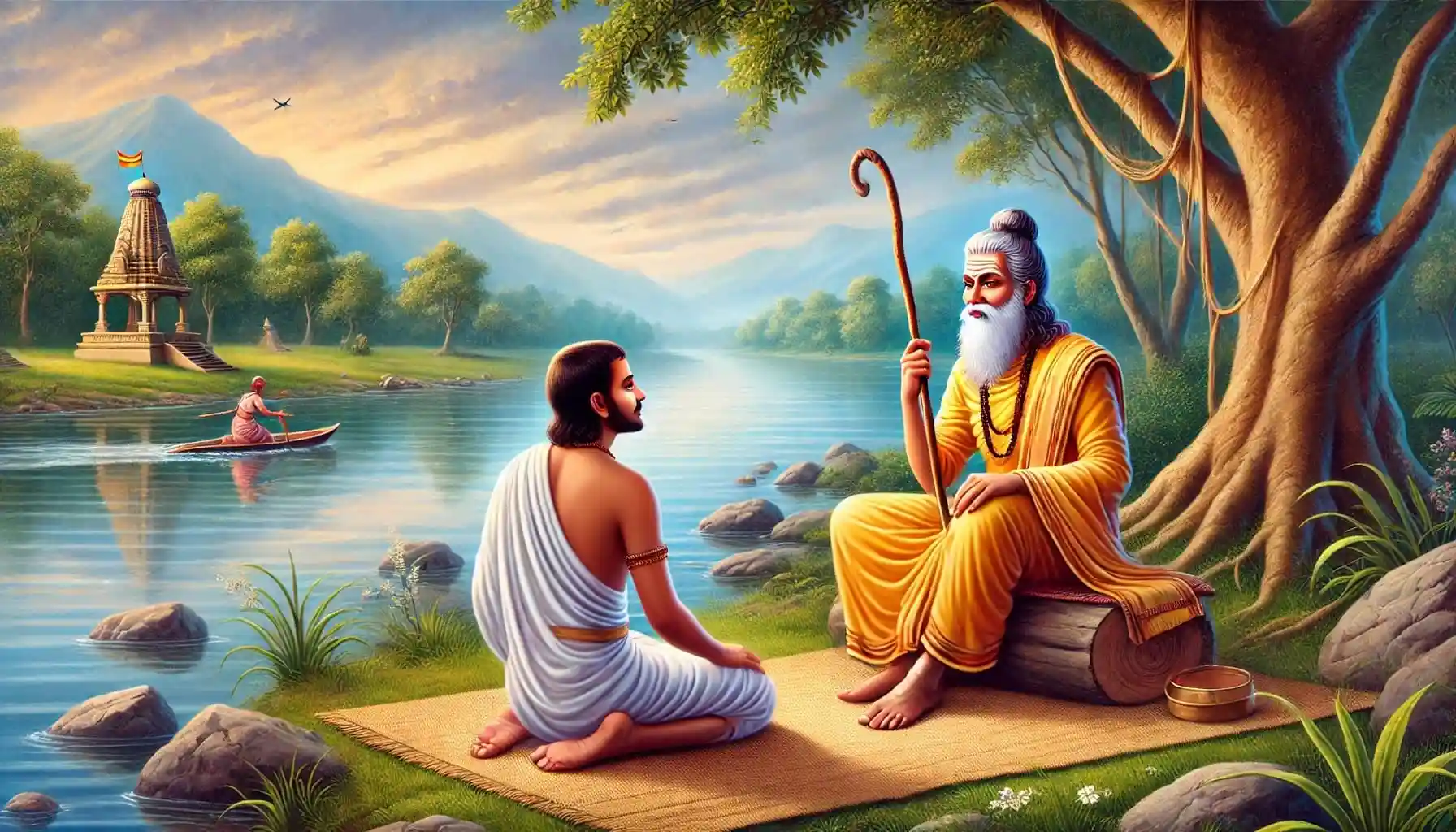The Spiritual Journey of Parikshit: Lessons from Shukadev

The conversation between Parikshit and Shukadev, as recounted in the Srimad Bhagavatam, offers timeless spiritual wisdom. The story begins with Parikshit, faced with the certainty of his impending death, seeking answers to questions that touch upon the essence of human existence and the ultimate goal of life. His inquiry is answered by Shukadev, the son of the great sage Ved Vyas.
In this blog, we will explore the key lessons from this sacred conversation, divided into three main sections: the nature of fear and attachment, the practice of meditation and devotion, and the essence of all spiritual knowledge. Through these teachings, Shukadev guides Parikshit (and through him, all seekers) toward the most powerful means of spiritual awakening and ultimate freedom.
The Quest for the Supreme Destination
The central question posed by Parikshit to Shukadev transcends time—what is the most powerful and effective way to attain the supreme destination in a short span of time? Knowing he has only seven days to live, Parikshit seeks answers that can help him prepare for the end of his life.
The Nature of Fear and Attachment
Shukadev’s response reveals a deeper truth: that every living being has only seven days to die. Shukadev tells Parikshit the story of his ancestor, Maharaj Khatwan, who helped the celestial Gods defeat the demons (Daityas). After the victory, the celestial Gods offered him a boon, and he asked how much time he had left to live. They told him he had only 1.5 hours. In that brief time, Maharaj Khatwan focused his mind, resolved to surrender to the Supreme, and achieved ultimate perfection, demonstrating that even in limited time, one can attain the highest spiritual goal with focused devotion.
While Parikshit is aware of his death and has time to prepare, others often live their lives oblivious to its certainty. Shukadev encourages Parikshit to let go of the fear of death and to embrace the inevitable with equanimity. He emphasizes that the primary cause of fear is attachment. Fear arises from clinging to material desires and attachments, whether to wealth, family, or bodily existence. To overcome this fear, one must learn to detach from worldly desires and surrender to the divine will. This surrender allows the realization that everything is in the hands of the supreme power.

Meditation and Devotion
Once the fear of death is transcended, Shukadev turns his focus to meditation. For Parikshit, who needs to give up hankering and aversion of the world, meditation becomes a powerful tool for spiritual awakening. Shukadev teaches him two forms of meditation essential to take the mind towards God.
The first form of meditation is Virat Ka Dhyan or the meditation on the cosmic form of God. This meditation involves contemplating the entire universe as a manifestation of the divine. It includes recognizing that God is present everywhere—in the sun, the moon, the rivers, and even in the heart of every being. By meditating on the cosmic form, the practitioner attains a sense of oneness with the universe, which helps dissolve attachment and aversion. This practice allows one to experience the divine presence in every aspect of life, fostering an attitude of surrender and humility.
Inspiration can be taken from saints like Saint Namdev of Maharashtra who saw God everywhere. Once while eating, a dog took his roti, and instead of being upset, Namdev imagined that God had come to eat. He ran after the dog with ghee, thinking it would hurt the deity’s throat to eat the dry roti, and wanted to make it softer. This story reflects his deep spiritual vision and the ability to see God in all beings.
The second form of meditation taught by Shukadev is Roop Dhyan, meditation on the personal form of God. While cosmic meditation brings a sense of universal connectedness, meditation on the personal form of God—such as Shree Krishna or any other deity—fosters a deep emotional connection. This personal devotion, or bhakti, strengthens love and affection for the divine, turning the heart towards God.
The Essence of All Spiritual Knowledge
In the final part of his teachings, Shukadev explains the essence of all spiritual knowledge. He reveals that the knowledge he imparts is not a product of his intellect, but the essence of the ancient Vedic scriptures. This knowledge has been passed down through generations and is meant to guide humanity towards a higher understanding of the self and the divine.
Shukadev says that the ultimate conclusion of all Vedic scriptures is to learn to love God. This love is the essence of spiritual practice, and one must cultivate it. Shukadev highlights the importance of Tridha Bhakti—the threefold devotion that includes chanting the names of God, hearing about the divine glories, and most importantly, remembering God at all times. These three practices are the foundation of a life dedicated to the divine, and by engaging in them, one can attain the highest spiritual fulfillment.
Conclusion
The teachings of Shukadev to Parikshit provide a profound roadmap for spiritual awakening. Through detachment from fear and attachment to the divine, and the cultivation of love for God, one can attain the supreme destination. Parikshit’s seven days of life were a metaphor for the finite nature of human existence, reminding everyone that life is short and that the most important task is to prepare the heart and mind for the divine.
Through devotion, meditation, and surrender, anyone can rise above the distractions of the world and achieve a state of unity with the divine. The story of Parikshit and Shukadev continues to inspire seekers of truth, teaching that the path to the ultimate destination is one of love, surrender, and deep spiritual connection.
Call to Action
Welcome the New Year and increase your devotion by participating in soulful kirtans and prayers at the upcoming Event hosted by Radha Krishna Temple of Dallas. Enhance your devotion further and develop love for Shree Krishna using Swami Mukundananda's guided meditation:
FAQs
1. What is the central teaching of Shukadev to Parikshit?
Shukadev teaches Parikshit that the key to attaining the supreme destination is overcoming fear and attachment, practicing meditation on both the cosmic and personal forms of God, and cultivating love for the divine. The ultimate essence of all scriptures is to love God.
2. How can one overcome the fear of death according to Shukadev?
Fear of death arises from attachment. By detaching from worldly desires and surrendering to the divine will, one can transcend the fear of death and face it with equanimity.
3. What is the significance of meditation in Shukadev ’s teachings?
Meditation helps in cultivating a deeper connection with God. The two types of meditation—Virat Ka Dhyan (cosmic meditation) and Roop Dhyan (meditation on the personal form of God)—allow one to transcend attachment and develop a loving relationship with the divine.
4. What is Tridha Bhakti?
Tridha Bhakti is the threefold devotion that includes chanting the glories of God, hearing them with devotion, and most importantly, remembering God at all times. This practice forms the foundation of a life of devotion.
Resources
Specific Video
Related Blogs
The Beginning of Kali Yuga: Parikshit's Curse and the Rise of Darkness

